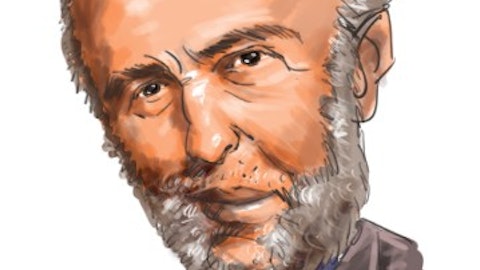Now I will say the one thing that could — I’m talking over time here, not tomorrow, but over time. If an M&A opportunity in Louisiana made sense for funding purposes, there obviously will also be some credit book associated with that bank. And so the only likelihood a CEO taking a step back from the 35% temporarily or whatever number we happen to be at it would be because we have made the business decision to partner with somebody that can help us with core deposits, which would ultimately help us in our overall growth goals. So I’m not saying that we’ll get to the 50% in the straight line, but so far over the past couple of years, we’re ahead of target and would anticipate continuing that strategy, reinvesting in those Texas markets to make the system as a whole stronger.
Feddie Strickland: Got it. Thanks Jude. Actually, I have one more as you say that. Is Texas going to be pretty much the market for you? Or would you consider as far as being outside of Louisiana would you consider another adjacent market, whether it’s Alabama or Arkansas or wherever? Or is there just so many opportunities in Texas, so that’s kind of probably be Texas, Louisiana going forward?
Jude Melville: Again, it depends on time frame, right? So we certainly think we have opportunities across the Southeast overtime. And so when those make sense to pursue, we feel like what we’ve done in Texas kind of shows our capability of doing that kind of thing. We’re not in any rush to do that. We feel like we do have plenty of opportunity in Texas really just in Dallas and Houston, not even the rest of Texas, you could work it for quite a bit of time maximizing that. Our future expansion once we feel like the time is right, will be as our previous expansion has been, will be banker-driven. So we — it’s our philosophy that we don’t just open up the shop and hope somebody comes, we find a good group of bankers to partner with.
And typically, we’ll do an LPO and then once we feel established, we’ll grow from there. So I certainly think if we found the right banking partners, we would be open to that idea. But most likely, that’s down the road and not something to contemplate in 2023, we have a lot of good potential ahead of us in the markets in which we’re currently operating. And feel like achieving a balance between growth and efficiency is something that we have an opportunity to do in a way that we haven’t in the past, and we’re excited about that.
Feddie Strickland: Makes sense to me. Thanks Jude.
Jude Melville: Thank you.
Operator: Our final question is a follow-up from Graham Dick with Piper Sandler. Your line is open.
Graham Dick: Hey guys. I just wanted to follow up on fee income really quick. — looks like Smith Shellnut Wilson had a pretty solid quarter, and then there’s also the SBIC income. Do you think that the income is probably going to drop back to like $7.5 million? Or do you think this $7.8 million; $7.9 million rate is sustainable? Thanks.
Jude Melville: No, I think you’re right, Graham, what we expect is that $7.5 million run rate going forward.
Gregory Robertson: Yes, the SBIC contributed about $400,000 more than we had expected.
Graham Dick: Okay. Awesome. And then one more quick one. I guess, just on the 2 credits that received specific reserves. I know you said one was due to fraud. I was just wondering if you could provide some color on each of those just like what industry they’re in, the type of collateral on each and then maybe the overall size of each credit as well.



